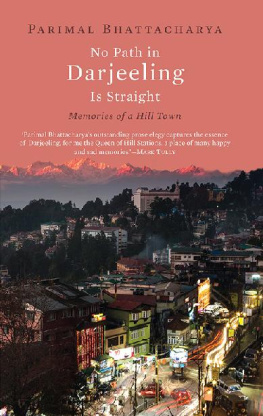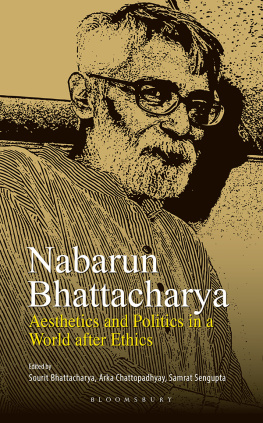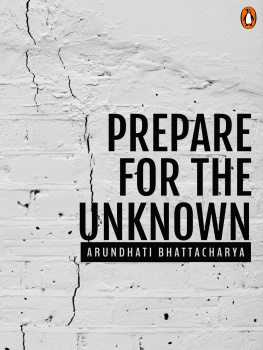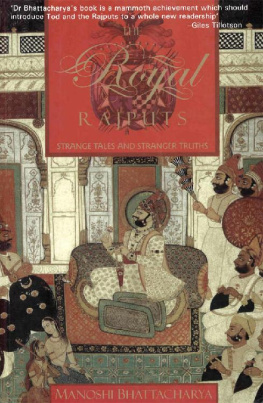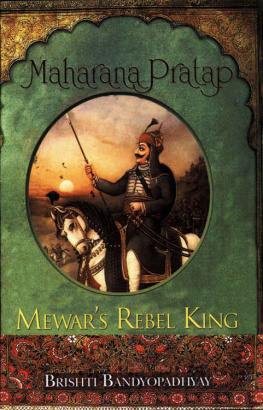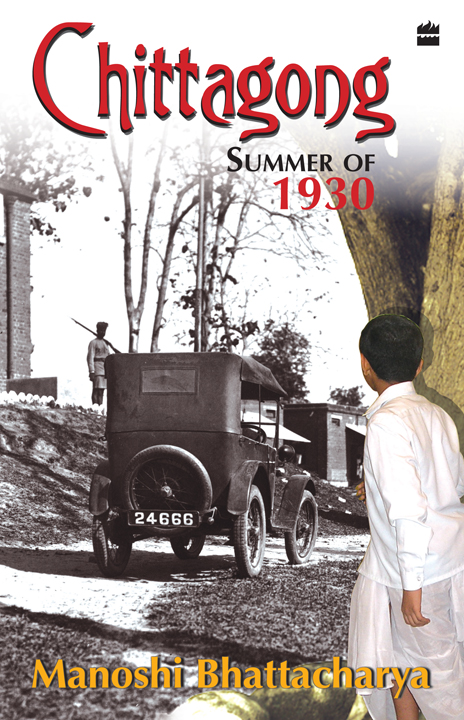
CHITTAGONG
Summer of 1930
M ANOSHI B HATTACHARYA

HarperCollins Publishers India
CONTENTS
A NANDA P RASAD G UPTA, 1923
The radio crackled to life. Jogendramohan Babus body stiffened. He had been leaning forward in his easy chair twiddling the knobs, when the few discernible words of the headlines stilled the lines of his body. Unable to withdraw his fingers, he sat as if glued into position.
A small dark head appeared from under the flowered kantha in the next room. Dark eyes peered across, ready to snap shut should his older brother turn around. Dada stood concealing himself behind the door-jamb, peeping into the living room where his father had turned on the radio. Deboprasad was all of twelve and worldly-wise. He had an opinion on most things and knew, it seemed, nearly everything. He could predict with confidence the outcome of most news items, and they fell from his lips like pearls of wisdom whenever Baba was not around. Rarely would he express them in the presence of his family, for they generated a predictable chain of responses: a cold grunt or nothing at all from his Baba, admiration shining through Mas unsmiling face and a look of repressed amusement from Thakur-Ma. But Anandas little face would stare in wonder, his mind hurriedly going over the precious words, trying to push them deeper into his head. They would come in handy before his classmates. It was useless to ask Dada what they meant or how he came to such conclusions, for he would either pretend not to hear or curl the corner of his upper lip in a sneer. Three years, Dada was three years older and that gave him such an advantage, such a wealth of knowledge and understanding.
Dada had raised himself on his toes, leaning at almost a dangerous angle, craning his neck to get at the words that had so excited the newsreader. Chatga was in the news again.
Chatga. The word ended with a nasal sound.
Ananda played around with it silently. That was not the way the genteel would pronounce it.
Chattogram. Now that was the way Baba would say it and so would the teachers at school. But old Thakur-Ma, who had cut her hair short and worn only white since the day Thakur-Dada died, would often lapse into the nasal Chatga. It was all right when she said it but if it slipped out of his mouth, it did not fail to attract Dadas unforgiving notice. A short snort and Ananda would quickly be reduced to embarrassment.
Chittagong. The British liked to call it Chittagong. It had a nice ring to it.
A movement caught the corner of his eye and biting his lip to keep himself from breaking into a wicked grin, he drew his eyes shut as if they never had been open.
Ma drew Dada away, her hands fondly caressing his right ear. It had not really been pulled and in any case it was time for school.
It was time to get up. Kneeling, he plunged his hands between the mosquito net and the side of the mattress that sat heavily upon the loose edge. Taking a good grip on the fabric, he tugged hard but lost balance and fell backwards. As he geared up once again to liberate himself he saw that a corner had come undone leaving a gap large enough to wriggle through. The four-poster bed towered over him. It would be many years before he would be tall and strong enough to pull out the fine drapes of netting and toss them onto the hammock-like top that stretched over the ornate wooden posts. He went to stand by the window sill. Dada would still be bathing and it would be best not to come across Thakur-Ma while still in yesterdays set of clothes.
Dada was at the table. Eat slowly, Khoka, Ma was admonishing him. The breakfast was being wolfed down. Dada was visibly excited.
Aye. Ma looked up at Ananda. Come. Sit.
Slipping into his chair, Ananda pulled at his thala until it was below his chin. It was past eleven and Babas chair was empty. Ma placed a gleaming golden kansha bowl filled with warm milk before him. Refusing the freshly fried luchis, he reached out for the sandesh. Deboprasad did not wait for his brother to finish. Rinsing his mouth with the water that had been kept overnight in an earthenware pot, he took a long draught.
Aashi. He called out. Ill be back.
Broad steps cut into the hillside leading the way out of the gate, past the European padres garden hedged off with its border of young greens that needed careful minding by hurrying feet. Ananda raced down the hill, scarcely feeling the cold wind that stung his cheeks making them glow. Chattogram was in the news. The full story would be relished only once he and his classmates had put together the little nuggets they had imbibed. These were adult matters. Not to be discussed in the presence of adults.
Little lanes wound past the houses leading to the broad tarmac road that led to school. The ground had long been trampled into submission but here and there, after the nights rain, it had turned into muddy patches and little puddles. But the sun was high in the sky, having cleared the last of the mists and drenching the rainwashed gardens with its pale rays. Himangshu waited at the bottom of the tila. That was their daily meeting point. Deftly skipping past the glistening pools, for, Gobindo-das eyes never ceased to burn the back of his neck, he turned down the slope and into the school lane. Makhon Jibon Ghoshal was puffing his way up. The Ghoshals house was amongst the largest in the valley standing across the street from the Sadarghat Kali Bari. Jibon was a year ahead in school but the two were thick as thieves.
Did you hear? Jibon called out. Master-da Surjya Sen has confounded the British again.
Ananda doubled up, holding onto his stomach as Himangshu took a flying leap kicking at the air. He landed with all the finesse of a martial arts warrior. The winter woollies did little to hamper his style.
They cant catch him.
They never will. Ananda laughed. He danced a couple of steps out of sheer joy before sprinting down the street with Gobindo-da chasing after them. He had relieved them all of their satchels and though his legs no longer found it easy to keep up with the flying warriors, he succeeded in getting them to the school gates on time.
Gobindo-da was well past his prime now, having begun his innings at the Gupta household as a twelve-year-old accompanying the new bride Thakur-Ma from her maternal home. He had been her personal errand boy, always at her beck and call. Since then, his role in the household had grown from picking quarrels with her to keep her amused, to a position of authority. Jogendramohan Babu acknowledged Gobindo-das place amongst the elders of the family and often meekly accepted a lashing from that rapier-like tongue. But the children knew they had him wound around their little fingers.
Master-da had surpassed all heroes, past and present. He could move like lightning, fly from rooftop to rooftop and disappear from sight at will. The British with their cumbersome police could do nothing. Their lathis and bullets could never find their mark. Dullwitted and slow, they continued to gape at the crowds that milled around them, failing to nab that veiled woman that brushed past them. No, they were no match at all.
School buzzed with news. Would a holiday be declared? After all, the Assam Bengal Rail Company had been looted. Seventeen thousand rupees had been stolen. It was being called the AB Railway Dacoity. A holiday had to be declared. The boys were ushered into the classrooms as usual at the stroke of twelve but even then it was obvious that the teachers were far too preoccupied. There would be no serious study today. Where were Sahayram and Subodh? Would they have heard the news? The little boys gulped down the information greedily.
Next page

